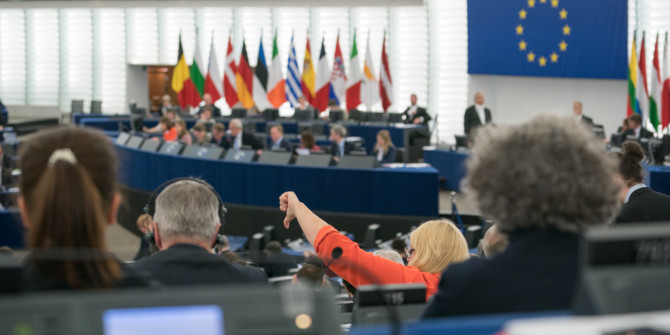 The present standoff between Greece and its creditors has centred around a package of reforms that must be approved before further financial assistance can be granted to the country. Aris Trantidis writes that while the focus has been on economics, the real cause of the deadlock stems from the realm of politics: both from the broad ideological commitments both sides have made and from the demands of domestic party politics. He argues that against this backdrop political rhetoric, such as the focus on Greece ‘spending beyond its means’, or the demand from the Greek government that Germany should pay around €279 billion in war reparations, has obscured the key macroeconomic issues that exist in Greece.
The present standoff between Greece and its creditors has centred around a package of reforms that must be approved before further financial assistance can be granted to the country. Aris Trantidis writes that while the focus has been on economics, the real cause of the deadlock stems from the realm of politics: both from the broad ideological commitments both sides have made and from the demands of domestic party politics. He argues that against this backdrop political rhetoric, such as the focus on Greece ‘spending beyond its means’, or the demand from the Greek government that Germany should pay around €279 billion in war reparations, has obscured the key macroeconomic issues that exist in Greece.
Greece and its banks are in need of financial support, which the EU institutions have retained on the grounds that Greece has yet to start enacting sufficient reforms, as it had previously agreed to do. But the Greek government believes that the previous agreement was the starting point of a shift away from the path of austerity and toward a new set of policies that, in its view, does not fuel recession by undermining domestic demand.
Despite two months of intense campaigning by the Greek Prime Minister, Alexis Tsipras, and his Finance minister, Yanis Varoufakis, little has changed in terms of the question of identifying what is the best policy mix for Greece. Europe exerts pressure on the Greek government to move further away from its pre-electoral critique of austerity and is not willing to back down on its preference for privatisation and market liberalisation, including labour market reforms. It refuses to examine whether deep-cutting austerity fuelled the recession, let alone open a broader discussion for the architecture of the Eurozone as a whole. Some will interpret Europe’s stance as exhibiting consistency in terms of its long-standing policy preferences. But the reality is more nuanced.
The underlying problem between Greece and the EU institutions is a clash of views over what kind of structural reforms Greece must follow to exit the crisis. To understand the reasons for this clash, we must delve into both macropolitical differences fuelled by the two sides’ distinct ideological and epistemic commitments and the realm of ‘micropolitics’ driven by domestic party politics.
Macropolitical differences
The predominant view in Europe and among many leading economists seems to be that Greece like any other country will benefit from a comprehensive programme of market liberalisation and privatisation. Syriza has a different theoretical and ideological standpoint which rejects, in principle, austerity, privatisation and labour market flexibility and, in their place, proposes reforms concerning tackling red tape and corruption, and promoting education and vocational training.
The Syriza-led government has yet to demonstrate that these reforms alone are good enough to restore growth in the Greek economy compared to the path of internal devaluation, labour market liberalisation and privatisation the previous government had committed itself to. At the same time, Europe avoids addressing questions related to the Eurozone’s architecture and its impact on countries such as Greece and shies away from discussing whether the same economic recipe works well amidst structurally dissimilar countries. In the case of Greece, have deep-cutting austerity measures and the internal devaluation of wages and assets done more harm than good in the short term, by undermining domestic demand too fast before the export sector recovers as expected?

There is still considerable scope for refining these policy prescriptions concerning the pace of reforms, the nature of privatisations and the ambiguous and highly-experimental strategy of internal devaluation as a substitute for currency devaluation. At present, it appears that the Syriza government has made a few considerable steps towards accepting Europe’s preference for structural reforms and privatisations, a concession that was unthinkable a few months ago, but it raises a number of reservations about further cuts in pensions, the privatisation of public utilities and further austerity measures.
It is on these issues that the discussion unfortunately falls against an epistemic and ideological wall. This is regrettable but it is not surprising. Politics operates under cognitive limitations regarding ever-changing and complex conditions. In search of policy advocacy, politicians make selective uses of epistemic arguments, but as these arguments are often contradictory, political debates over the ‘right’ policies ultimately feed upon epistemic controversies.
Moreover, politics reflects distinct ideological viewpoints which include various perceptions of ‘good’ policy. At times, a set of views is prevalent in the epistemic community and, when endorsed by the majority of political forces, becomes the economic ‘orthodoxy’. Adopting this orthodoxy then acts as a rigid bulwark against the prospect of policy revision and a filter for policy proposals that challenge the established policy practices. Rather than being subject to constant revision, economic orthodoxy becomes the kaleidoscope through which many policy-makers and academics view the world.
Micropolitical considerations and party politics
If politics were solely driven by a dialogue on macropolitical terms it would be realistic to regard any policy disagreements as the outcome of this debate with its cognitive and ideological limitations. Political actors sharing the same economic rationale may more easily reach an agreement about the general direction of policy and may debate secondary issues of designing, pacing and fine-tuning economic reforms.
In the case of Greece, a rapprochement between the Syriza-led government and its creditors would lead to a commonly agreed package of reforms that would better fit Greece’s local circumstances. It could involve a milder and more prolonged pace of fiscal adjustment and structural reforms adjusted to the specific circumstances of the Greek economy, possibly focusing on tackling red tape and corruption, enacting market liberalisation when it will most likely generate new jobs, and adopting labour market policies in the spirit of ‘flexicurity’.
But disagreements over the choice of policies often stem from considerations beyond epistemic and ideological positions. Here we enter the sphere of ‘micropolitical’ considerations, where the choice of public policy is shaped not merely by political actors reflecting upon the aggregate collective-level consequences of different policy options but thinking in terms of the impact each option would have on their own personal or party-level circumstances. These micropolitical considerations are directly related to political agents’ careers prospects: their chances for re-election, the loyalty of party supporters, their alliance with strong interest groups and approval by the broader network of personal connections which they are part of.
Micropolitical considerations play a significant part in the Greek drama. On the one hand, European politicians who had enacted and implemented austerity policies in their constituencies are not keen to applaud any rhetoric that undermines their political position at home. Greece is currently the only country that openly and vocally challenges the economic status quo in Europe, and European politicians see Syriza’s message as a voice of ‘populism’ that can sweep across their constituencies too.
On the other hand, Syriza has promised policies that it can only deliver if a substantial change of views occurs in the rest of Europe. This has not happened so far and is unlikely to happen in the near future. Syriza is currently facing immense pressure to compromise on its pre-electoral pledges, but any step towards compromise must be justified in the eyes of its voters and members who had been expecting a different political direction. Further policy compromise from the side of Syriza, to a degree that amounts to complete reneging on its pre-electoral programme and ideological vision, may not be politically sustainable.
However, the party is caught between a rock and a hard place. If the government rejects further compromise, it risks a serious fiscal ‘accident’, which may do greater damage to the government’s capacity to engage in distributional politics. But if it backs down and follows policies roughly similar to what the previous government did, it may see its popular support plummeting.
At present, Syriza’s strategy is to show to its voters that ‘it tries its best’ to change attitudes in Europe but claim that it is simply not allowed to do everything it promised. Still, if Syriza is asked to cross certain ‘red lines’, it may prefer to clash with Europe to protect its internal cohesion as a left-wing party. If this happens, the party could blame the European institutions for the negative developments that may occur in Greece.
A battle of words
Both macropolitical differences and micropolitical considerations have driven the unfolding Greek drama to several points of standstill and further deferral, while its political actors engage in an attritional battle of words. Spokespeople from the European Institutions insist that the previous Greek government has signed up to agreements that the Syriza-led government must equally respect, as a way to rule out a debate over the actual feasibility of these reforms in the case of Greece.
In short, pacta sunt servanta. But it is not difficult to understand why this legalistic approach to a political issue is an unconvincing argument. In a decision-making environment overwhelmed with uncertainty, policy must be driven by on-going feedback from the observed outputs of previous policy changes. It is exactly because understanding error is the most effective way to tackle cognitive limitations affecting the choice and design of ‘optimal’ policy that a dialogue of retrospection must take place.
The narrative endorsed by the EU institutions ignores the dynamic nature of decision-making in conditions of uncertainty and it can be illustrated with the following allegory. Imagine that five years ago you had a severe stomach problem and the doctor prescribed you a course of medication to treat your condition. While taking the medication, you experienced some complications that you and other doctors suspected may be side-effects of any of these drugs or their specific mixture. These side-effects caused a potentially fatal problem with your liver, suggesting that the dosage was too strong.
When you visit your doctor, she insists that you should continue this treatment and refuses to evaluate what went wrong in your case, claiming that statistical reports show that each of the medicine prescribed seemed to be working well in the general population. Instead, the doctor reminded you that you have been inconsistent with certain doses and that many of the complications you are experiencing, unusual as they may be, can be attributed to this. When you ask the doctor to change the composition or dosage of this prescription, the doctor reminds you that you agreed to this treatment five years ago, citing the legal disclaimer you have signed up: pacta sunt servanta.
Substantial concerns about the Greek economic programme are hidden behind rhetorical controversy and mutual mistrust. Greece is depicted as an exceptional case, a rebellious adolescent who simply does not listen to wise advice; hence, a drop of its GDP by 30 per cent and unemployment rates around 25 per cent. Central to this micropolitical rhetoric is also the motto that the ‘Greeks lived beyond their means’, often implying that the pains of economic adjustment are somewhat understandable. This is a half-truth, given the rate of public borrowing by other governments too, particularly following the 2008 financial crisis.
On the side of Greece, the rhetoric is also unusually hostile, bringing centre-stage the question of German war reparations, the systemic risks of a Greek exit and the role of Greece as a European buffer to immigration. A report released by Greece on 7 April put the figure for German war reparations at almost €279 billion. The government also quite boldly makes a straightforward point about Greece’s geostrategic role, which seems to be part of a maximalist strategy that hopes to gain as many policy concessions as possible. This discourse also helps the government address its domestic audience and remind its supporters that, unlike the previous Greek governments, it stands up to its European counterparts with a degree of autonomy and determination.
What will the endgame be? The tough rhetoric from both sides may backfire. The current political standstill keeps the Grexit discussion alive, fuelsdeposit outflows and deters much-needed investment. The ECB is keeping up the pressure too with a stance whose political objective is controversial. While Europe and the world speculates on various scenarios – whether Greece will experience a financial accident; who shall take the blame for it; and whether the Greek government will distance the country away from the West – few public figures are willing to engage in a serious discussion about the key macropolitical issues at stake.
Is too much austerity politically and socially sustainable? Is it desirable to privatise a state monopoly or is it better to break this monopoly in a way that would give way to a more competitive private market? What are the side-effects of internal devaluation on the banking system? Is a strategy to create an export-led economy feasible when the economy has been largely fuelled by domestic demand-led growth over recent decades?
Greece’s economic saga is a clear testimony to the real nature of decision making in politics, one which is bound by cognitive biases, locked in ideological predispositions and driven by micropolitical considerations: these are the foundations of unforeseen and unintended consequences which tend to move history in unexpected directions.
Please read our comments policy before commenting.
Note: This article gives the views of the author, and not the position of EUROPP – European Politics and Policy, nor of the London School of Economics.
Shortened URL for this post: http://bit.ly/1H1paoa
_________________________________
 Aris Trantidis – King’s College London
Aris Trantidis – King’s College London
Aris Trantidis is a Visiting Lecturer in the Department of Political Economy at King’s College London.





